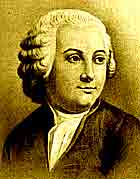Great Throughts Treasury
This site is dedicated to the memory of Dr. Alan William Smolowe who gave birth to the creation of this database.

Étienne Bonnot de Condillac
French Philosopher and Epistemologist
"We see plainly what were the subjects of the earliest poems. At the first institution of societies, mankind could not as yet employ themselves in matters of amusement; so that the wants which obliged them to unite, at the fame time confined their views to whatever might be useful or necessary to them. Therefore poetry and music were cultivated merely with a design to promote the knowledge of religion and laws, or to preserve the memory of great men, and of the services which they had done to society."
"What we have been saying in regard to imagination and memory, must be applied to contemplation, according as it is referred to either. If it be made to consist in retaining the perceptions; before the use of instituted signs it has only a habit which does not depend on us: but it has none at all, if it be made to consist in preserving the signs themselves."
"When words were become the most natural signs of our ideas, the necessity of arranging them in an order so contrary to that which at present prevails, was no longer the fame. And yet they continued to do it, because the character of languages, having been framed from this necessity, did not permit any change. to be made in this custom; neither did they begin to draw near to our manner of conceiving, till after a long succession of idioms."
"With regard to natural cries, this man shall form them, as soon as he feels the passions to which they belong. However they will not be signs in respect to him the first time; because instead of reviving .his perceptions, they will as yet be no more than consequences of those perceptions."
"We judge the objects to touch only because we have learned to judge. In fact, if we consider the size of an object, we see that it is relative to that of other objects, so we have to compare it with and judge the extent to which these differ from them, if we want to get an idea of its size, and so for ideas of substance, of shape and weight. In other words, all the ideas that come from touch presuppose the comparison and judgment."
"Verbs originally expressed the state of things, only in an indeterminate manner. Such are the infinitives, to go, to act. The action accompanying them supplied the rest ; that is, the tenscs4 moods, numbers, and persons. In saying tree to fee, they signified by some gesture, whether they spoka of themselves or of a third person, of one or of many, of the past, present, or future, in fine, whether in a positive or in a conditional sense."